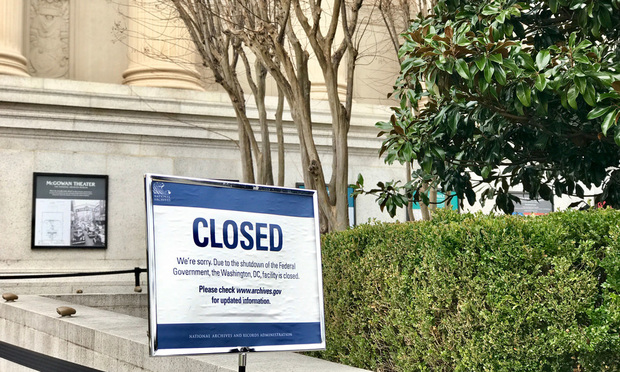Government Shutdown Leaves Law Student Externs Scrambling
Those who planned to extern at federal agencies affected by the closures must decide whether to hold out hope for the government to reopen, find new externships or just take classes instead.
January 08, 2019 at 04:22 PM
6 minute read
 Sign at National Archives Museum informs public that due to shutdown facility is closed. Photo: Jer123/Shutterstock.com
Sign at National Archives Museum informs public that due to shutdown facility is closed. Photo: Jer123/Shutterstock.com
Hundreds of law students across the country who expected to extern this semester at federal agencies now find themselves in limbo amid the nearly three-week-old partial government shutdown.
Some are waiting to see whether their agencies reopen or return to full operations in time to collect academic credit for the spring semester, while others are rushing to line up alternate externships at nonprofits and non-governmental agencies, or federal agencies that aren't affected by the shutdown, according to externship coordinators at law schools that send students to the nation's capital to gain real-world experience. Still other students have abandoned the externship plan this spring and are taking classes instead, since the semester began Monday at many campuses.
"Just like the rest of the country, the shutdown has caused confusion, anxiety, and a lot of disappointment," said Jessica Tillipman, assistant dean for field placement at George Washington University Law School. "The students have been planning for a semester to extern for credit. These are huge components on their resumes. To not know when they are going to start is concerning."
Between 50 and 60 George Washington students are feeling the impact of the shutdown, which represents about half of the school's spring semester externs, Tillipman said. Externs in the federal judiciary are still on track to work, but that could change if the courts' funding runs out in the coming weeks, she added.
Law schools thus far are facing few other consequences of the shutdown beyond the uncertainty over government externships. They aren't directly funded by the government, and the shutdown has not yet affected the federal student loan program, which is the single largest source of funding for law campuses. Law schools receive the occasional federal grant, but those awards tend to be long-term and insulated from temporary shutdowns.
The one exception is the University of the District of Columbia David A. Clarke School of Law, the only public law school in Washington, where the federal government controls local government spending. But the school has remained fully funded and open thanks to an exemption granted to the District of Columbia through the Office of Management and Budget. It has largely been business as usual, according to interim Dean John Brittain.
Even so, the school surveyed students, faculty and staff Tuesday to find out how many people have family members furloughed under the shutdown, which might impact their financial circumstances.
"We want to express empathy, and find any other way we can accommodate them during this shutdown period," Brittain said.
This isn't the first time law schools have needed to help externs during a government shutdown. Large swathes of the federal government shuttered for 17 days in October 2013 amid Congressional disagreement over the budget. The timing of the current shutdown was less of a problem for law schools because it began during the holiday break instead of the middle of the semester. That situation made it easier for students to change direction and take classes instead or line up a different externship before it got too far into the spring semester. Still, law school administrators say this shutdown is more worrisome than in 2013.
"We've had externships delayed in the past due to shutdowns, but this is more extreme," said Julie Fromholz, director of the international rule of law and security program at the Arizona State University Sandra Day O'Connor College of Law who also oversees the school's Washington program. "This is more stressful for everyone because it's so uncertain."
Students who require security clearances for their externships but who have yet to receive them face an additional hurdle. Even if the federal government fully reopens in the next week, externs could be further delayed by a backlog of security clearance requests. Thus, it's that cohort as well as students in their final semester of law school who face the most pressure to either find a new externship or take classes to ensure they receive enough credit to graduate. Third-year students who are soon to graduate don't have the option of taking additional credits later on or extending their externships into the summer because of a delayed start, Tillipman said.
Half of the students in ASU's Washington program have been affected by the shutdown, according to Fromholz. Three opted to stay in Phoenix rather than risk a cross-country move without any certainty that their externships would move ahead as planned. (Unlike students from Washington-area law schools who typically extern part-time while also taking classes, those in Washington programs offered by schools outside of the D.C. area often extern full-time. And a growing number of law schools across the country have such programs.)
Another four students at ASU are waiting to see if their government externships come to fruition, Fromholz said. Those students aren't lining up other externships just yet, and if necessary they can extern with several international law projects that are part of the McCain Institute for International Leadership, A Washington-based think tank affiliated with ASU.
"It's not ideal for them," Fromholz said. "It's not what they intended. But in the short-term it can get them the credit hours they need for the first two or three weeks."
The University of Georgia School of Law is tapping its alumni network to help students in the school's Washington, D.C., semester in practice program whose full-time externships are on hold. Those students were due to begin their externships Tuesday.
"Because the end of the shutdown is difficult to predict, we are reaching out to our large alumni base in Washington, particularly those alums working for committees on the Hill, non-profits and those agencies unaffected by the shutdown," said Jessica Heywood, who runs Georgia's program. "We are extremely pleased with the alumni response, and we are confident our students will have plenty of opportunity for quality, substantive legal work regardless of shutdown's length."
The lack of clarity on the likely length of the current shutdown is part of what has made the situation so difficult for students and law school administrators, Tillipman said, more so than in the previous shutdowns.
"[The 2013 shutdown] felt long and it had an impact on our students," she said. "But it felt like we knew there was some negotiating going on and there seemed to be an end in sight. When you hear a statement like, 'This could go on for months or years,' that's not reassuring. This feels like the parties are so far apart."
A continued shutdown could also sour some students from pursuing careers in the government, she added.
"We have a lot of students who want to go work for the government," Tillipman said. "You never want to see a law student discouraged from that by seeing lawyers who are getting shut out of work without a paycheck."
This content has been archived. It is available through our partners, LexisNexis® and Bloomberg Law.
To view this content, please continue to their sites.
Not a Lexis Subscriber?
Subscribe Now
Not a Bloomberg Law Subscriber?
Subscribe Now
NOT FOR REPRINT
© 2025 ALM Global, LLC, All Rights Reserved. Request academic re-use from www.copyright.com. All other uses, submit a request to [email protected]. For more information visit Asset & Logo Licensing.
You Might Like
View All
Law Firms Expand Scope of Immigration Expertise Amid Blitz of Trump Orders
6 minute read


Zoom Faces Intellectual Property Suit Over AI-Based Augmented Video Conferencing
3 minute readTrending Stories
- 1Uber Files RICO Suit Against Plaintiff-Side Firms Alleging Fraudulent Injury Claims
- 2The Law Firm Disrupted: Scrutinizing the Elephant More Than the Mouse
- 3Inherent Diminished Value Damages Unavailable to 3rd-Party Claimants, Court Says
- 4Pa. Defense Firm Sued by Client Over Ex-Eagles Player's $43.5M Med Mal Win
- 5Losses Mount at Morris Manning, but Departing Ex-Chair Stays Bullish About His Old Firm's Future
Who Got The Work
J. Brugh Lower of Gibbons has entered an appearance for industrial equipment supplier Devco Corporation in a pending trademark infringement lawsuit. The suit, accusing the defendant of selling knock-off Graco products, was filed Dec. 18 in New Jersey District Court by Rivkin Radler on behalf of Graco Inc. and Graco Minnesota. The case, assigned to U.S. District Judge Zahid N. Quraishi, is 3:24-cv-11294, Graco Inc. et al v. Devco Corporation.
Who Got The Work
Rebecca Maller-Stein and Kent A. Yalowitz of Arnold & Porter Kaye Scholer have entered their appearances for Hanaco Venture Capital and its executives, Lior Prosor and David Frankel, in a pending securities lawsuit. The action, filed on Dec. 24 in New York Southern District Court by Zell, Aron & Co. on behalf of Goldeneye Advisors, accuses the defendants of negligently and fraudulently managing the plaintiff's $1 million investment. The case, assigned to U.S. District Judge Vernon S. Broderick, is 1:24-cv-09918, Goldeneye Advisors, LLC v. Hanaco Venture Capital, Ltd. et al.
Who Got The Work
Attorneys from A&O Shearman has stepped in as defense counsel for Toronto-Dominion Bank and other defendants in a pending securities class action. The suit, filed Dec. 11 in New York Southern District Court by Bleichmar Fonti & Auld, accuses the defendants of concealing the bank's 'pervasive' deficiencies in regards to its compliance with the Bank Secrecy Act and the quality of its anti-money laundering controls. The case, assigned to U.S. District Judge Arun Subramanian, is 1:24-cv-09445, Gonzalez v. The Toronto-Dominion Bank et al.
Who Got The Work
Crown Castle International, a Pennsylvania company providing shared communications infrastructure, has turned to Luke D. Wolf of Gordon Rees Scully Mansukhani to fend off a pending breach-of-contract lawsuit. The court action, filed Nov. 25 in Michigan Eastern District Court by Hooper Hathaway PC on behalf of The Town Residences LLC, accuses Crown Castle of failing to transfer approximately $30,000 in utility payments from T-Mobile in breach of a roof-top lease and assignment agreement. The case, assigned to U.S. District Judge Susan K. Declercq, is 2:24-cv-13131, The Town Residences LLC v. T-Mobile US, Inc. et al.
Who Got The Work
Wilfred P. Coronato and Daniel M. Schwartz of McCarter & English have stepped in as defense counsel to Electrolux Home Products Inc. in a pending product liability lawsuit. The court action, filed Nov. 26 in New York Eastern District Court by Poulos Lopiccolo PC and Nagel Rice LLP on behalf of David Stern, alleges that the defendant's refrigerators’ drawers and shelving repeatedly break and fall apart within months after purchase. The case, assigned to U.S. District Judge Joan M. Azrack, is 2:24-cv-08204, Stern v. Electrolux Home Products, Inc.
Featured Firms
Law Offices of Gary Martin Hays & Associates, P.C.
(470) 294-1674
Law Offices of Mark E. Salomone
(857) 444-6468
Smith & Hassler
(713) 739-1250








